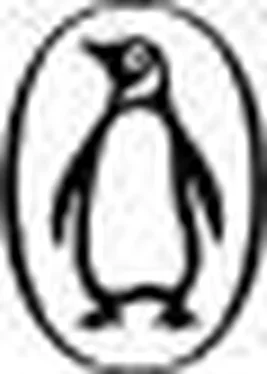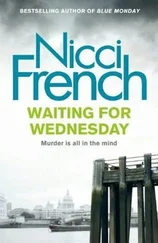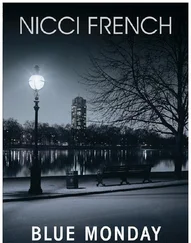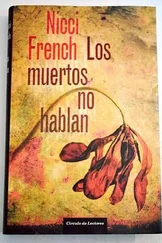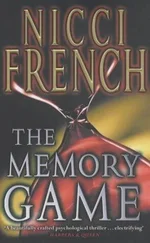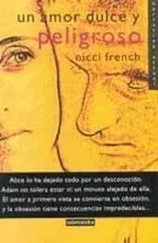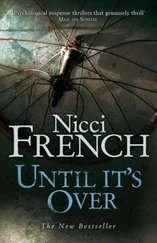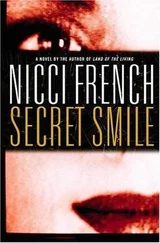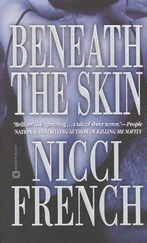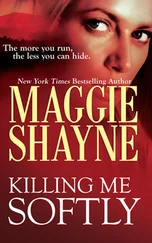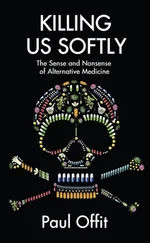I didn’t know where I was going to go, although I didn’t tell them that. Later there would be statements to make, forms to sign in triplicate, solicitors to see. Later, I would have to face up to my past and confront my future, try to climb out of the ghastly wreckage of my life. Not now, though. Now I was just inching along numbly, trying to put words in the right order until I was left on my own somewhere, to sleep. I was so tired I thought I could go to sleep standing up.
Detective Inspector Byrne steered me up the stairs to the flat. The door hung uselessly on its hinges, where Adam had broken it down. My knees buckled, but Byrne held my elbow and we walked in, followed by his officer.
‘I can’t,’ I said, stopping abruptly in the hall. ‘I can’t. I can’t go in here. I can’t. I can’t. I just can’t.’
‘You don’t have to,’ he said. He turned to the woman. ‘Pick up some clean clothes for her, will you?’
‘My bag,’ I said. ‘I only need my bag, really. My money’s in there. I don’t want anything else.’
‘And her bag.’
‘It’s in the living room,’ I said. I thought I was going to throw up.
‘Have you got family you can go to?’ he asked me, as we waited.
‘I don’t know,’ I said feebly.
‘Can I have a word with you, sir?’ It was the woman officer, with a grave face. Something had happened.
‘What… ?’
‘Sir.’
I knew then. It was knowledge that went through me like a ripple of pure sensation.
Before they could stop me I had run through into the living room. My beautiful Adam was there, turning ever so slowly on the rope. I saw that he had used a length of climbing rope. Yellow climbing rope. A chair lay on its side. His feet were bare. I touched the mutilated foot very gently, then I kissed it, as I had done that first time. He was quite cold. He was wearing his old jeans and a faded T-shirt. I looked up at his puffy, ruined face.
‘You would have killed me,’ I said, staring up at him.
‘Miss Loudon,’ said Byrne at my side.
‘He would have killed me,’ I said to him, without taking my gaze away from Adam, my dearest love. ‘He would have done.’
‘Miss Loudon, come away now. It’s over.’
Adam had left a note. It wasn’t a confession, really, nor a self-explanation. It was a love letter. ‘My Alice,’ he had written, ‘To see you was to adore you. You were my best and my last love. I am sorry it had to end. For ever would have been too short a time.’
In the middle of the evening a few weeks later, after the clamour, after the funeral, there was a knock at the door. I went down and there was Deborah, looking unusually smart in a skirt and dark jacket, tired-looking after a day at the hospital. We gazed at each other, unsmiling. ‘I should have got in touch earlier,’ she said at last.
I stepped aside and she walked past me up the stairs. ‘I’ve brought two things for you,’ she said. ‘This.’ She removed a bottle of Scotch from a plastic bag. ‘And this.’ She unfolded a page from a newspaper and handed it to me. It was an obituary of Adam. It was by Klaus, for a newspaper that I didn’t normally get. ‘I thought you might like to see it.’
‘Come through,’ I said.
I took the whisky, a couple of glasses and the newspaper cutting and went into the living room. I poured us each a drink. Like a good North American, Deborah went back into the kitchen in search of ice. I looked at the cutting.
Above the article itself, across four columns, was a picture of Adam I hadn’t seen before, sunburned, no hat, on a mountain somewhere, smiling at the camera. How rarely had I seen him smile or look carefree. In my mind he was always grave, intense. Behind him was a range of mountains like sea waves in a Japanese etching, caught at the moment of still perfection. That was what I had always found difficult to grasp. When you saw the photographs from high up, it was so clear and beautiful. But what they’d all told me – Deborah, Greg, Klaus, Adam, of course – was that the real experience of being up there was everything that couldn’t be captured in the photograph: the unbelievable cold, the struggle to breathe, the wind that threatened to pick you up and blow you away, the noise, the slowness and heaviness of the brain and body and, above all, the sense of hostility, the feeling that this was a non-human world you were ascending briefly in the hope that you could survive the assault of the elements and your own physiological and psychological degeneration. I stared at Adam’s face and wondered who he was smiling at. In the kitchen I heard the chink of ice.
Klaus’s text made me wince at first, as I glanced through it. He was partly writing a personal memorial to his friend and also trying to fulfil the professional obligation of the obituarist. Then I read it through word by word:
The mountaineer, Adam Tallis, who died recently by his own hand, achieved fame through his heroic actions during the disastrous storm last year on the Himalayan mountain of Chungawat. It was a fame he had not looked for, and he was uncomfortable in the spotlight – but he was as graceful and charismatic as ever.
Adam was the product of a military family, which he rebelled against (his father participated in the first day of the Normandy landings in 1944). He was born in 1964 and educated at Eton but was unhappy at school and indeed was never willing to submit himself to any form of authority or institution that he considered undeserving. He left school for good when he was sixteen and literally set off alone across Europe, travelling overland.
Klaus then gave a précis of the account in his book of Adam’s early mountaineering career and of the events on Chungawat. He had taken note of the correction in Guy magazine. It was now Tomas Benn who was poignantly calling for help before he sank into a coma. This led to the climax of Klaus’s article:
In asking for help, too late, Benn was speaking for a form of humanity that Adam Tallis embodied. There have, especially in recent years, been those who have claimed that normal morality ceases to operate as we approach the summits of the highest mountains. This brutal approach may have been encouraged by the new trend in commercial expeditions in which the leader’s obligation is to the client who has paid him and the client depends on the expert guides to keep him or her alive. Adam himself had strongly voiced reservations about these ‘yak trails’ by which unqualified but prosperous adventurers were ushered up climbs which had previously been the province of teams of élite climbers.
Yet, and here I speak as a man whose life was saved by Adam Tallis, in the middle of that terrible storm he lived up to the greatest traditions of Alpine and Himalayan fellowship. It seemed that the pressures of the market place had taken over even in that rarefied world above 8,000 metres. But somebody had forgotten to tell the mountain god of Chungawat. It was Adam Tallis who showed that, in extremis, there are deeper passions, more basic values.
On his return from Chungawat, Adam was far from idle. Always a man of strong impulses, he met and married a beautiful and spirited woman, Alice Loudon,
Deborah was back in the room. She sat down beside me and sipped at her whisky, studying my face as I read on:
a scientist with no background in mountaineering at all. The couple were passionately in love, and Adam’s friends thought he had found the stable centre of his life that this troubled rover had always been searching for. It was, perhaps, significant that his planned expedition to Everest next year was not to summit but to clean the mountain, perhaps his own form of reparation to deities that had been defied and insulted for too long.
Читать дальше
